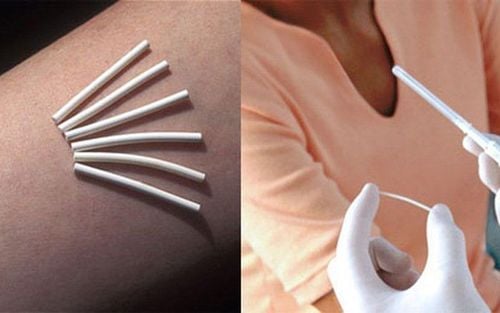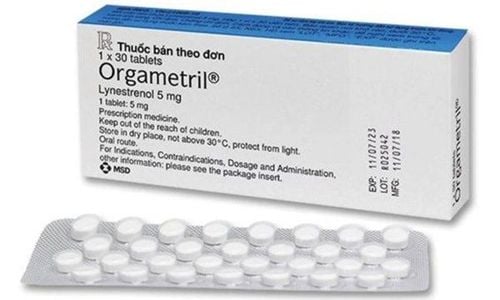This is an automatically translated article.
Do birth control pills get menstruating? Or take birth control pills to miss periods? This is a matter of great concern to many people, because abnormal vaginal bleeding is the most common side effect of birth control pills. To learn more about this issue, follow along in the article below.1. How does the contraceptive injection work?
Progestin - the hormone found in birth control injections, prevents pregnancy in three ways. First, this hormone prevents the ovaries from releasing an egg during ovulation. If there is no egg to fertilize, your chances of getting pregnant are zero. At the same time, this hormone also helps increase the production of mucus on the cervix. This sticky mucus buildup prevents sperm from entering the uterus.
Finally, the hormone progestin will also reduce the growth of the endometrium. This is the tissue lining the uterus that helps facilitate the attachment of the placenta. In the unlikely event that the ovaries have released an egg during ovulation and the sperm can fertilize the egg, the fertilized egg will have a hard time attaching to the lining of the uterus. This is because hormones make the lining thin and unsuitable for the developing embryo.
One injection prevents pregnancy for three months very effectively. According to the manufacturer's instruction sheet Depo-Provera, the effectiveness of the birth control shot has ranged from 99.3% to 100% in clinical studies.
Every 12 weeks, a woman who wants to continue birth control needs a booster shot to maintain protection from pregnancy. If you arrive later than this time, avoid intercourse or use a backup plan. Your doctor will probably ask you to take a pregnancy test if you don't get the shot at the right time.
In addition, you may need to use a form of emergency contraception if you have had unprotected sex in the past 120 hours or five days and you are more than a week late in using birth control by injection with the hormone progestin.
2. Types of menstrual disorders that can occur when taking birth control pills
The injection of birth control pills can cause abnormal vaginal bleeding and other side effects of menstrual disorders. Therefore, you may experience these problems for 6 to 12 months after you start using the first injection. The most common vaginal bleeding problems include:
2.1. Heavy bleeding Some women will experience bleeding or bleeding between periods for several months after starting the injection. 70% of women using injectable contraception may experience unexpected bleeding within the first year.
2.2 Menstruation As you can see, injections make your periods heavier and longer. This type of hypermenorrhoea is uncommon but is still possible and may resolve several months after you have had the injection.
2.3. Menstrual bleeding, menstrual bleeding less than usual or no period After a year of using injectable birth control pills, up to half of women report that they no longer have periods. Not having a period, called amenorrhea, is safe and common if you're taking the birth control shot. If periods don't stop completely, some people may find that their periods are lighter and much shorter than they used to be.
3. Other side effects when taking birth control pills
In addition to vaginal bleeding or menstrual irregularities as above, choosing birth control pills can also cause other side effects. However they are usually rare and mild and include:
Abdominal pain Weight gain, changes in appetite Mood changes Changes in sex drive Hair loss Occurrence of acne Increased facial and body hair Tension Breast pain Breast pain Headache, dizziness Nausea Fatigue However, most women will be able to adjust to the hormone levels of the birth control shot within a few months or after several courses of treatment. Serious problems are very rare.
In summary, if you are interested in getting the birth control shot and have questions about whether the injection will cause your period or if the injection will cause a missed period, keep in mind that these problems are common. Most women experience breakthrough bleeding or spotting during the first few months or completely amenorrhea after starting the injection. Fortunately, in most cases it can take only six months to a year before the side effects stop and your period returns to normal. Therefore, with the possible risks, as well as the almost absolute contraceptive effectiveness from the choice of birth control injection, you need to consult a lot of information to make a decision on the most suitable method for you. myself.
Follow Vinmec International General Hospital website to get more health, nutrition and beauty information to protect the health of yourself and your loved ones in your family.
Please dial HOTLINE for more information or register for an appointment HERE. Download MyVinmec app to make appointments faster and to manage your bookings easily.













